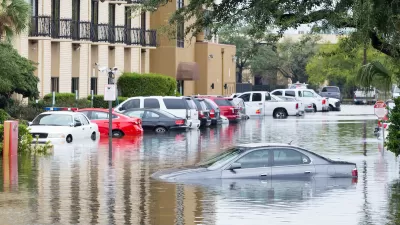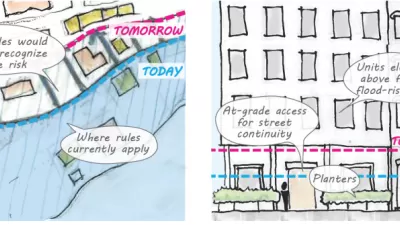Hurricane Sandy demonstrates that the impacts of climate change -- rising sea levels and more extreme weather patterns -- mean that the future of America's coastal cities is in doubt.
Mike Tidwll, writing for The Nation, argues that all coastal American cities are facing the fate of New Orleans, and that hard decisions lie ahead: either these great cities are to be abandoned, or they commit to increasingly more sophisticated and expensive systems of levees and dikes. The most difficult adjustment, however, is to move rapidly away from the burning of fossil fuels. He writes,
"The New York Academy Sciences has already begun examining the viability of three massive floodgates near the mouth of New York Harbor, not unlike the Thames River floodgate that protects London today. Another floodgate has been proposed for the Potomac River just south of Washington, fending against tsunami-like surge tides from future mega storms. Plus there will be levees-everywhere. Imagine the National Mall, Reagan National Airport and the Virginia suburbs-all well below sea level-at the mercy of "trust-us-they'll-hold" levees maintained by the Army Corps of Engineers.
Oceans worldwide are projected to rise as much as three more feet this century-much higher if the Greenland ice sheet melts away. Intense storms are already becoming much more common. These two factors together will in essence export the plight of New Orleans, bringing the Big Easy 'bowl' effect here to New York City and Washington, as well as to Charleston, Miami, New York and other coastal cities. Assuming we want to keep living in these cities, we'll have to build dikes and learn to exist beneath the surface of surrounding tidal bays, rivers and open seas-just like New Orleans."
FULL STORY: We Are All from New Orleans Now: Climate Change, Hurricanes and the Fate of America's Coastal Cities

Alabama: Trump Terminates Settlements for Black Communities Harmed By Raw Sewage
Trump deemed the landmark civil rights agreement “illegal DEI and environmental justice policy.”

Study: Maui’s Plan to Convert Vacation Rentals to Long-Term Housing Could Cause Nearly $1 Billion Economic Loss
The plan would reduce visitor accommodation by 25% resulting in 1,900 jobs lost.

Planetizen Federal Action Tracker
A weekly monitor of how Trump’s orders and actions are impacting planners and planning in America.

Wind Energy on the Rise Despite Federal Policy Reversal
The Trump administration is revoking federal support for renewable energy, but demand for new projects continues unabated.

Passengers Flock to Caltrain After Electrification
The new electric trains are running faster and more reliably, leading to strong ridership growth on the Bay Area rail system.

Texas Churches Rally Behind ‘Yes in God’s Back Yard’ Legislation
Religious leaders want the state to reduce zoning regulations to streamline leasing church-owned land to housing developers.
Urban Design for Planners 1: Software Tools
This six-course series explores essential urban design concepts using open source software and equips planners with the tools they need to participate fully in the urban design process.
Planning for Universal Design
Learn the tools for implementing Universal Design in planning regulations.
Caltrans
Smith Gee Studio
Institute for Housing and Urban Development Studies (IHS)
City of Grandview
Harvard GSD Executive Education
Toledo-Lucas County Plan Commissions
Salt Lake City
NYU Wagner Graduate School of Public Service





























